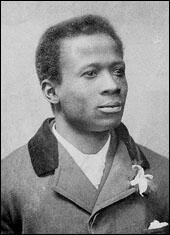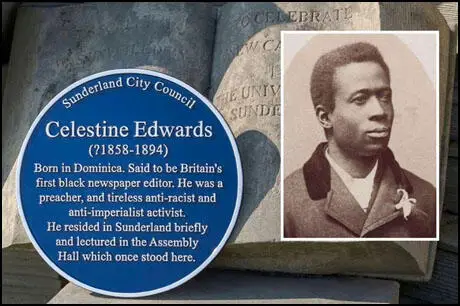Celestine Edwards

Celestine Edwards, the youngest of nine children, was born on the island of Dominica on 28th December, 1858. At the age of 12 he became a sailor. During the next few years he developed radical opinions about politics and became a strong supporter of human rights.
In the 1870s Edwards he settled in Edinburgh, Scotland. He became involved in the temperance movement. Later he lived in Sunderland before moving to London. Edwards worked as a building labourer but in his spare time he made speeches in Victoria Park about issues such as slavery.
Edwards helped Walter Hawkins write his autobiography, From Slavery to Bishopric (1891). Hawkins, a former slave, eventually became a bishop of the Methodist Episcopal Church in Canada. He also became editor of the weekly Christian newspaper, Lux (1892-1895). Edwards also became executive secretary of the Society for the Recognition of the Brotherhood of Man and edited its monthly journal, Fraternity (1893-1897).
Edwards continued to make public speeches. In Bristol on 3rd July, 1893, Edwards spoke on lynching in the United States. The following week he spoke to 1,200 people in London on "American Atrocities". In August he was in Liverpool lecturing on 'Blacks and Whites in America'. Similar talks were given in Plymouth, Aberdeen, Newcastle, Edinburgh and Glasgow. Popular topics included 'The Negro Race and Social Darwinism' and 'Liquor Traffic to West Africa'.
Celestine Edwards had a strong desire to become a doctor and enrolled at the London Hospital. However, his health was poor, and in May 1894 he returned to his family in Dominica. He died at his brother's house on 25th July, 1894.

Primary Sources
(1) Celestine Edwards, Lux (10th December, 1892)
As long as such unrighteous deeds as cold-blooded murders are permitted under the British flag, as long as avarice and cupidity prompt the actions of a missionary nation, so long we shall protest against public money being spent in the interest of land-grabbers.
The injustice under which the black man is smarting will come home to his oppressors' children's children. He will surprise and disappoint those who never dreamt that the quiet happy-go-lucky black would turn like the worm upon those who wronged him. If the British nation stole no more, they have stolen enough and have sufficient responsibility at home and abroad to occupy her maternal attention for the next hundred years. If the British nation has not murdered enough no nation on God's earth has.
(2) Celestine Edwards, Lux (18th February, 1893)
The day is coming when Africans will speak for themselves. The day is breaking, and the despised African, whose only crime is his colour, will yet give an account of himself. We think it no crime for Africans to look with suspicion upon the European, who has stolen a part of their country, and deluged it with rum and powder, under the cover of civilisation.
(3) Celestine Edwards, speech in Newcastle (3rd November, 1894)
My ancestors proudly trod the sands of the African continent;but from their home and friends were dragged into the slave mart and sold to the planters of the West Indies. The very thought that my race should have been so grievously wronged is almost more than I can bear. Of the condition of my people today I but tarry to say that by diligence, thought, and care they have given the lie to many a false prophet who, prior to their Emancipation, sought to convince the world that the black man was in all respects unfit for freedom. Their position today is one over which I proudly rejoice. To their future I look with confidence.

